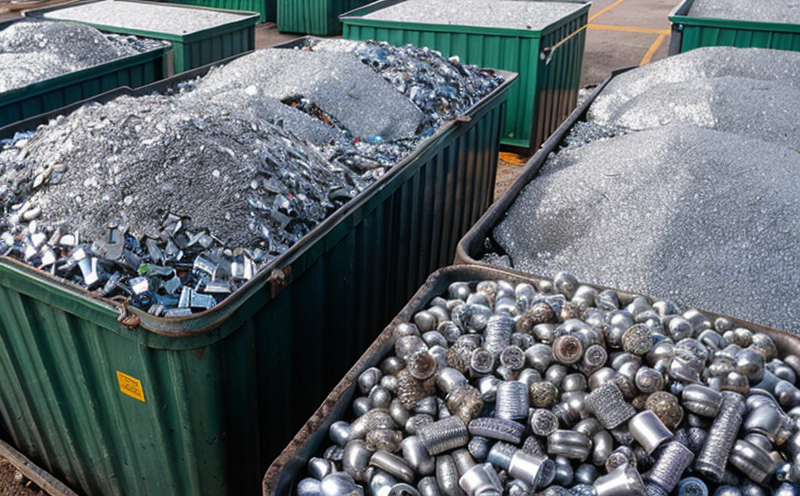ISO 20807 X-ray Fluorescence for Alloy Sorting
The ISO standard ISO 20807 establishes a robust framework for using X-ray fluorescence (XRF) spectrometry to sort and identify metallic alloys. This service is particularly beneficial for industries dealing with metal and alloy recycling, ensuring that materials are accurately classified based on their chemical composition.
The process involves the use of an XRF spectrometer, which measures the energy and number of photons emitted by atoms after being bombarded with high-energy X-rays or gamma rays. This interaction results in the emission of secondary radiation from the atom’s outer shell electrons, known as fluorescence. By analyzing these emissions, we can determine the elemental composition of a given sample.
This method is highly precise and non-destructive, making it ideal for quality assurance in metal recycling. It allows for rapid analysis without damaging the sample, which is crucial when dealing with valuable metals that must be sorted accurately to maximize their reusability. The service covers various types of alloys commonly found in recycling processes, including stainless steel, aluminum, brass, and copper.
Our XRF spectrometers are calibrated according to ISO 20807 standards, ensuring consistent and reliable results across multiple samples. This standardization is essential for maintaining high-quality control throughout the recycling process. The service also includes detailed reports that outline the elemental composition of each sample tested, providing clear insights into the purity and grade of the metal.
By using this method, we can help our clients meet stringent environmental regulations while optimizing material recovery rates. This not only reduces waste but also minimizes the need for virgin raw materials, contributing to sustainable manufacturing practices. The accuracy provided by ISO 20807 ensures that recycled metals are sorted correctly according to their grade and purity, enhancing overall product quality.
The implementation of this service in metal recycling facilities allows them to streamline operations, improve efficiency, and reduce costs associated with incorrect sorting or contamination. It also supports the development of new alloys by providing detailed elemental data on existing materials.
Our team of experts is dedicated to ensuring that every test conducted adheres strictly to ISO 20807 standards. We employ advanced instrumentation and follow rigorous procedures to guarantee accurate results. This commitment to precision and reliability has earned us a reputation as one of the leading providers of metal recycling testing services globally.
Scope and Methodology
The scope of this service encompasses the application of ISO 20807 XRF spectrometry to analyze metallic alloys. The methodology involves several key steps:
- Sample Preparation: Ensuring that samples are clean, free from contaminants, and representative of the material being tested.
- Spectrometer Calibration: Using certified reference materials to calibrate the XRF spectrometer according to ISO 20807 standards.
- Data Collection: Collecting emission spectra data using the calibrated instrument.
- Data Analysis: Processing collected spectral data to determine elemental concentrations within specified limits.
- Reporting: Producing detailed reports outlining results, including elemental compositions and any relevant compliance information.
This comprehensive approach ensures that all tests are conducted in accordance with international standards, providing clients with accurate and reliable results.
Eurolab Advantages
At Eurolab, we pride ourselves on offering unparalleled expertise and advanced technology when it comes to metal recycling testing. Here’s why you should choose us:
- Comprehensive Testing Capabilities: Our state-of-the-art facilities support a wide range of tests beyond just ISO 20807 XRF, ensuring that we can meet all your analytical needs.
- Precision and Reliability: Using cutting-edge equipment and adhering strictly to ISO standards, our results are consistently accurate and dependable.
- Expertise and Experience: Our team of highly skilled professionals brings extensive knowledge and experience in metal recycling analysis.
- Customer-Centric Approach: We understand the importance of timely delivery and work closely with you to ensure your projects proceed smoothly.
- Compliance and Standards: Ensuring that all our tests comply not only with ISO 20807 but also other relevant standards like ASTM, EN, IEC where applicable.
- Environmental Responsibility: By offering precise testing services, we help reduce waste and promote recycling practices aligned with environmental goals.
We are committed to providing you with the highest quality service possible, ensuring that your metal recycling operations remain compliant and efficient.
Competitive Advantage and Market Impact
- Innovation Leadership: Stay ahead of competitors by leveraging our cutting-edge technology and methodologies.
- Compliance Excellence: Ensure compliance with international standards, reducing the risk of non-compliance penalties.
- Economic Efficiency: By accurately sorting metals, you can optimize material use, reduce production costs, and enhance product quality.
- Sustainability Focus: Contribute to sustainable practices by minimizing waste and maximizing resource recovery.
- Market Differentiation: Gain a competitive edge in the market through superior analytical capabilities and reliable results.
The adoption of ISO 20807 XRF for alloy sorting is transforming the metal recycling industry. By providing precise, consistent, and compliant testing services, we enable our clients to meet environmental regulations while maintaining high standards of quality control. This not only enhances their reputation but also drives profitability by optimizing resource utilization.
Our service has a significant market impact by fostering innovation in alloy development and ensuring that recycled materials are fit for purpose across various industries. By offering this advanced testing method, we are contributing to the broader goals of sustainability and efficiency within the metal recycling sector.





